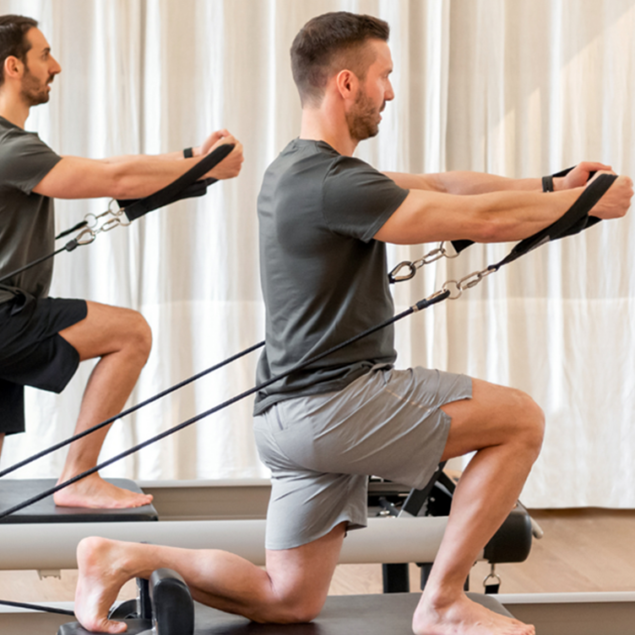
For many, life never seems to slow down. Finding time to care for yourself can often take a backseat between work, errands, friends and family, potentially leading to burnout and stress. Thankfully, reformer Pilates is and continues to be a powerful way to combat these challenges. Regular practice can allow you to create a well-rounded routine that better supports your overall health and well-being.
Beyond the flexibility and strength-boosting perks of this low-impact exercise, there are many mental health benefits of Pilates. In this blog, we’ll outline five cognitive benefits of Pilates that can help contribute to a healthy, happier you.
One major benefit of reformer Pilates is its ability to reduce stress, even during high-intensity workouts. These classes challenge you to elevate your heart rate through intense movements while simultaneously regulating your breath.
This balance between intensity and controlled breathing is key — it’s about raising your heart rate and bringing it back down. By staying connected to your breath, you activate the body’s parasympathetic nervous system, helping to calm the mind and relax the muscles, even as you push through demanding exercises. This mindful breathing allows you to harness the power of effort and recovery, leaving you refreshed and centred by the end of the session.
Pilates’ physical movements also help release endorphins, the body’s natural “happy” hormones. These endorphins can boost your mood, further alleviating nerves and feelings of stress and anxiety. Over time, regular Pilates practice can lead to a more resilient mind that’s better equipped to handle the ups and downs of daily life.
Pilates is widely recognised as a mind-body workout, demanding complete focus as you work through different movements. The controlled breathing techniques that are central to Pilates not only aid in physical performance but also foster mindfulness. By focusing on your breath and the precision of each movement, you can achieve a state of mental clarity and calm.
The benefits of practising mindfulness through Pilates don’t stop at mental clarity. It also contributes to emotional regulation. When you’re mindful, you become more aware of your thoughts and emotions, allowing you to respond to situations calmly rather than impulsively. This heightened emotional awareness can improve relationships, reduce conflicts and lead a more balanced, peaceful life.
Whether you’re new to Pilates or a seasoned pro, everyone agrees it’s both challenging and rewarding. As you attend regular classes and build strength, flexibility and endurance, it won’t be long before you can perform exercises that once seemed impossible. Achieving these milestones can boost your confidence, positively impacting your mental health.
This kind of empowerment also nurtures a growth mindset — the concept that effort and perseverance can further develop your abilities and intelligence. This shift in perspective can positively affect other areas of your life — such as your career, personal goals and relationships — by instilling the belief that you can overcome obstacles and achieve success through dedication and hard work.
Whether you’re attending a group class at a studio nearby or participating in an online session, Pilates allows you to connect with others who share similar interests. This sense of community can improve your mental health, as social connections are essential for maintaining optimal emotional well-being. Making new friends, sharing mutual experiences and supporting one another in your Pilates journey can lead to lasting relationships that enrich your life.
The social aspect of Pilates also provides accountability and motivation. When you commit to a class with friends or become part of a Pilates community, you will likely stick with your practice.
In the hustle and bustle of daily life, it’s easy to neglect taking care of yourself. When you commit to a regular Pilates practice, you’re consciously investing in your well-being. This act of self-care — taking time to focus on your body and mind — gives you space to prioritise your needs. It reminds you that you deserve to take care of yourself and that doing so is not a luxury but a necessity.
Burnout is also becoming increasingly common. By recharging your body and mind through reformer Pilates, you can return to your responsibilities with renewed energy and a clearer perspective. Plus, finding the perfect balance between work, personal commitments and self-care means you can better prevent the exhaustion that typically arises when you neglect your needs.
While there are several mental health benefits of Pilates, there are other things you can do outside your classes to support your mental well-being, including:
What you eat can have a profound impact on how you feel. A diet rich in fruits, vegetables, lean proteins and whole grains can help stabilise your mood and provide the energy needed to stay active and engaged in your daily life. Staying hydrated is also essential for mental clarity, so keep up with your daily water intake.
Incorporating meditation into your daily routine can further support the mindfulness and stress-relief benefits you gain from Pilates. Meditation helps to quiet the mind and improve your ability to focus — so even a few minutes per day can significantly alter your emotional state.
Creativity can be a powerful tool for self-discovery and personal growth. Whether it’s writing, drawing, or listening to music, exploring new hobbies or revisiting old ones can help you develop a deeper understanding of what brings you joy and happiness.
There are many benefits of Pilates, from improving your strength and physical endurance to reducing stress and giving you the chance to take some time for yourself.
If you’re searching for the perfect place to start your practice, look no further than KX Pilates. Our trainers provide a welcoming and supportive environment for anyone to start or continue their Pilates journey, allowing you to step into a more confident, stronger you.
Discover the benefits of reformer Pilates with KX Pilates and book a class today.